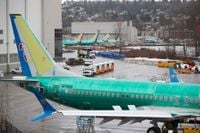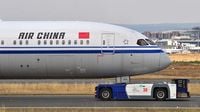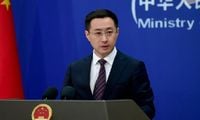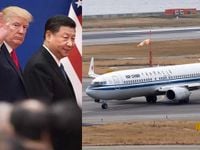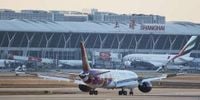BEIJING— China has ordered its airlines to stop taking jet deliveries from American aviation giant Boeing, according to Bloomberg. This development marks a significant escalation in the ongoing trade dispute between the world’s two largest economies.
Approximately 10 Boeing 737 Max jets are currently being prepared to join Chinese airlines. Sources told Bloomberg that if delivery paperwork and payment were completed before Chinese “reciprocal” tariffs took effect, these planes might still be allowed to enter the country.
Since President Donald Trump took office in January 2025, the United States and China have engaged in a tit-for-tat tariff battle. The US has imposed levies of up to 145 percent on Chinese imports. Beijing has responded with retaliatory duties of 125 percent on US imports, describing American actions as unlawful “bullying.”
According to people familiar with the matter, China has ordered its carriers to halt Boeing plane deliveries. The directive also includes suspending purchases of aircraft-related equipment and parts from US companies. However, the Chinese government is considering helping carriers that lease Boeing jets and now face higher costs due to the tariffs.
The restriction represents a serious blow for Boeing and other manufacturers attempting to navigate the escalating trade tensions. Beijing’s reciprocal tariffs on US imports would likely trigger significant cost increases for bringing aircraft and components into China. Boeing shares have fluctuated due to concerns about trade tariff impacts and shareholder complaints. The company has lost 7 percent of its market value since the beginning of the year.
In March, Boeing’s chief financial officer, Brian West, acknowledged that tariffs could affect parts availability from suppliers.
Michael O’Leary, group chief executive of Ryanair, said that his company might delay taking deliveries of Boeing aircraft if they become more expensive. Ryanair expects to receive 25 aircraft from Boeing starting in August 2025 but won’t need them until around March or April 2026. “We might delay them and hope that common sense will prevail,” O’Leary remarked.
Trump’s series of tariffs has disrupted world markets and upended diplomatic relations with allies and adversaries alike. The US president announced an unexpected freeze on further increases last week but gave Beijing no immediate relief. US officials on Friday revealed exemptions from the latest duties against China for high-end tech goods such as smartphones, semiconductors, and computers.
European aircraft manufacturer Airbus stated on Tuesday that it is monitoring the evolving trade tariff situation. CEO Guillaume Faury informed shareholders that the company is experiencing problems receiving components from American supplier Spirit AeroSystems, which is affecting the production of its A350 and A220 jetliners.
As the situation continues to develop, both Boeing and Chinese airlines await further clarity on how these trade restrictions will affect their operations in the long term.
The Chinese government has blocked its airlines from taking delivery of Boeing aircraft and U.S.-made aerospace equipment, according to a Bloomberg report. This decision shows how exposed Boeing and major U.S. aerospace suppliers are in the escalating conflict.
According to Aviation Week Network’s fleet forecast, 44 Boeing aircraft are due to be delivered to Chinese airlines in 2025. Most of them are 737-8/9s, but Boeing is also planning to hand over four 777Fs and three 787-9s to Chinese carriers this year. Airlines most affected by the order are Xiamen Airlines (seven 737-8s), Air China (six 737-8s), and China Southern (six 737-8s).
Thirty-six Boeing aircraft are earmarked for delivery to China in 2026. None of the airlines nor the government have officially commented on the issue so far. The conflict could also have an impact on China’s Comac C919 program. The narrowbody is equipped by CFM International Leap-1C engines and has many U.S.-made components.
Boeing has 130 aircraft yet to be delivered to China and Hong Kong based on its current unfilled orders numbers. The vast majority of them are 737 MAXs, but Cathay Pacific has a significant order in place for 21 777Xs. Okay Airways and Ruili Airlines have a total of 11 787-9s on order.
China has not placed large orders for Boeing aircraft for some time, which explains why the backlog for Chinese customers is relatively small. But Boeing forecast in its 2024 Current Market Outlook that China will take delivery of 20 percent of all large commercial aircraft manufactured over the next 20 years. If the delivery stop is sustained for longer, Airbus is set to benefit. The company is forecast to deliver around 850 aircraft to Chinese operators in the next 10 years.
In 2025, 136 are to be handed over to Chinese airlines, and 148 are earmarked for them in 2026. Airbus plans to deliver around 820 aircraft globally this year.
The Chinese government has told Chinese airlines to halt deliveries and purchases of Boeing jets and aeroplane parts made by US companies in the latest action in what has become a frenetic trade war between Washington and Beijing. The order came after Juneyao Airlines decided to delay receiving a Boeing 787-9 plane, and President Xi Jinping announced 125 percent tariffs on US goods. Both of these actions were in response to US President Trump’s 145 percent levies on Chinese goods entering the US.
At least 10 Boeing 737-MAX jets were expected to be delivered to major Chinese airlines, including China Southern Airlines, Air China, and Xiamen Airlines. China has been a key strategic sales arena for Boeing for several years. In its 2024 Commercial Market Outlook, the Seattle-based manufacturer identified a likely doubling in both passenger and freight operations in the country by 2040.
According to Boeing’s research, China is expected to boast the world’s largest aviation traffic flow inside the next 20 years. Darren Hulst, Boeing’s vice president of commercial marketing, said at the time: “China’s commercial aviation market for passengers and cargo continues to expand, driven by economic growth and airlines building their in-country networks.”
Boeing said it expected China to require 8,830 aircraft deliveries by 2043 and would have hoped to benefit from a significant slice of that market before President Trump launched his tariff war. Beijing’s reaction could be seen as a vote of confidence in its burgeoning domestic manufacturing market. COMAC’s C-919 passenger aeroplane has been ordered and/or received by several major Chinese airlines, including China Eastern, Air China, and China Southern Airlines. In August last year, it claimed to have an order book of at least 1,000 planes.
Globally, Boeing delivered 130 commercial jets in Q1 2025. As the trade war continues, the implications for both Boeing and the global aviation market remain uncertain.
